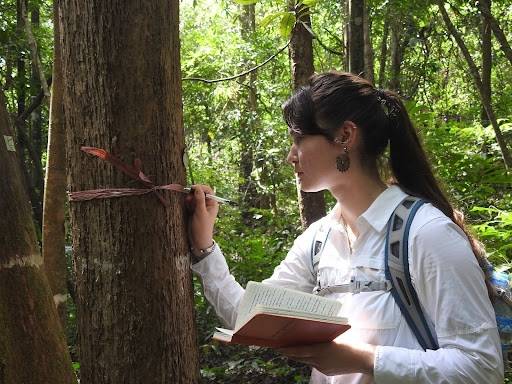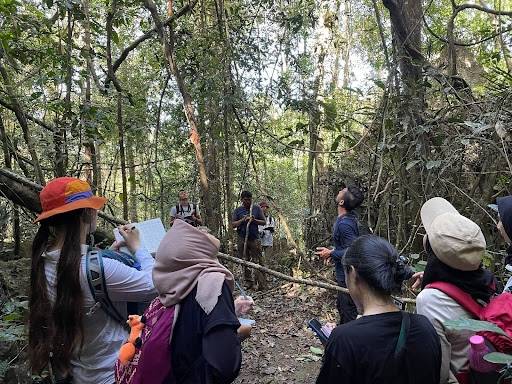SDSU students gain research, cultural skills studying macaques in Indonesia

Emily Rapp spent six weeks in Indonesia last summer studying endangered Moor macaques in the wild – except for the time when one mischievous monkey had other ideas.
When she set her backpack by the side of the road for a second, the primate ran up, snatched her binoculars and scampered up a tree.
“He became curious, ran up a tree and tried to eat them like food,” she said.
This quirky encounter is just one of many anecdotes that Rapp and two other SDSU undergraduates tell about their experience during a funded, study-abroad initiative run by Dr. Erin Riley, a professor in SDSU’s anthropology department and assistant dean of the college of graduate studies.
The centerpiece of the Indonesia Fieldwork Experience program is observational research of Moor macaques in the rainforest. But SDSU students also get a deep dive into the culture, food, and people of Sulawesi – the region where Riley and collaborators from Hasanuddin University conduct integrated research on primates and the forest ecosystem.
Students hopped on the back of motorcycles to get rides to the rainforest. They played Indonesian card games at night with local university students and hosts – their conversation aided by Google Translate. They got a kick out of Indonesians’ love of music and singing, as evidenced by karaoke nights fueled by coffee and desserts.
Most of all, they raved about the hospitality and cooking of Mama Aco, head of the family that housed and fed students in Bengo, a village near Bantimurung-Bulusaraung National Park.
“For some reason, it took us until the end of our trip to ask Mama Aco if we could take part in this special art of hers, and she was so happy to have us in her kitchen making her traditional recipes,” said Amaru Marchant, a SDSU undergraduate who plans to pursue additional field research opportunities in environmental sciences.

Applications for the summer 2024 Indonesia Field Work Experience program are due Feb. 15, with a virtual information session scheduled on Feb. 1. For more information, contact the Global Education Office.
Riley obtained funding through a three-year grant from the National Science Foundation’s International Research Experience for Students program.
“The ultimate goal is to produce a diverse and globally engaged workforce with high-quality research skills,” said Riley. “The skills that you build by participating in this program are really transferrable, and there is a lot of cross-cultural community and international teamwork, which you can take with you into any career.”
Moor macaques are threatened by habitat loss and deforestation to increase agricultural land. This can lead to human-primate conflicts as the macaques eat crops to replace dwindling forest resources, said Riley.
For the students who went last summer, the field research stands out. Matthew Hall recalls a day with few macaque sightings, but a local field assistant was determined to find the monkeys and left the group for about 10 minutes before returning.
“All of a sudden, we are swamped with Moor macaques,” said Hall. “There were juveniles, adult males and females -- all types. It was one of the coolest things I have ever witnessed, just completely awe-inspiring seeing all these monkeys at once.”
Language was a roadblock, and Hall wished he had learned more Bahasa Indonesia before the trip. "There are great English speakers there, but at the same time, because we are in their country, we want to be speaking their language. You want to show that respect to their culture.”
Rapp said the experience solidified her plans to pursue science education and seek additional field research opportunities. The program has helped her develop cross-cultural communication skills, especially during conversations with Indonesian students.
“Working and talking with them in the field helped me understand their culture more and gain more knowledge about their research in the forest,” she said.

